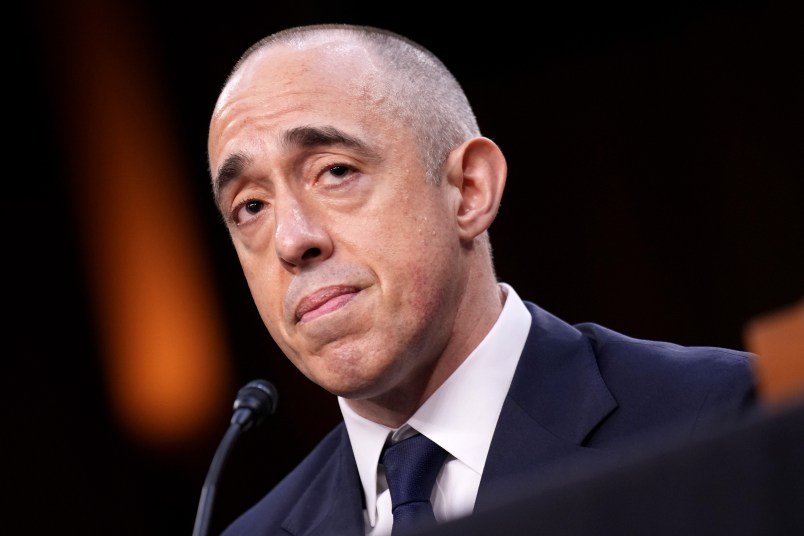It’s true: he won’t be like other judges.
Emil Bove — whose nomination to a seat on the Third Cirucit the Senate Judiciary Committee advanced Thursday morning — spent the past several months in a senior role at the DOJ tearing through barriers that were created to separate federal law enforcement from partisan politics. He purportedly told attorneys to be ready to say “fuck you” to the courts if they blocked Alien Enemies Act removals to CECOT. He moved to dismiss prosecutors who worked on the January 6 investigation.
Many of these barriers would have been pitched battles in Trump’s first term. But this time around, the erosion happened quickly, with relatively muted outcry from the mainstream press and little backlash politically. There’s an almost vertiginous feeling that comes with writing about it. Aren’t these the rules? Wasn’t any of this supposed to matter?
Perhaps not. The Senate is poised to confirm Bove on Thursday to a seat on the Third Circuit Court of Appeals. It’s a victory for Bove’s ambition, but also for Trump’s. Appellate courts are usually pretty rarified — full of academics, former district court judges, and high-flying attorneys in private practice. Cynics may argue that it’s no accident that the level of abstraction increases in direct proportion to judges’ ability to interpret and thereby create new law, but the Bove appointment is something else entirely: part of an attempt to mold the judiciary towards loyalty to Trump personally.
There’s a series of cascading failures that led to how we got here.
President Trump nominated Bove to a seat that had been occupied by Judge Joseph A. Greenaway. President Barack Obama nominated Greenaway to the seat in June 2009, filling a vacancy opened up by the departure of Samuel Alito for the Supreme Court. For the Democrats, that was a net gain. Greenaway retired from the bench in June 2023, during a 51-seat Democratic Senate majority.
In theory, with more than a year before the next election, that was more than enough time for Senate Democrats to fill the seat. President Biden nominated Adeel Mangi in November 2023. Mangi would have been the first Muslim to serve as a federal circuit judge.
During his first hearing before the Senate Judiciary Committee on December of that year, Senate Republicans redirected the focus away from the law, and onto Mangi’s background. Sen. Ted Cruz (R-TX) raised Mangi’s involvement with Muslim community organizations, and asked at one point if he condemned Hamas. All of this took place weeks after Hamas’ Oct. 7 attack on Israel.
The Judiciary Committee advanced Mangi to a full Senate vote. But within months, reports began to emerge that Senate Democrats were telling the White House that there weren’t enough votes to confirm Mangi. Sens. Jacky Rosen (D-NV) and Catherine Cortez Masto (D-NV) both said publicly that they wouldn’t vote to confirm Mangi; then-Sen. Joe Manchin (D-WV) announced he would only consider nominees with bipartisan support. The White House refused to withdraw Mangi’s nomination. By the end of 2024, Democrats and Mangi himself were calling the process “fundamentally broken.”
The impasse left Trump to fill the seat, giving conservatives another seat on a Circuit Court that had been closely split with six Democrat-appointed judges and seven Republican appointees.
Trump left the seat open until May, when he nominated Bove.
During the Senate Judiciary Committee vote on Thursday morning, Senate Democrats walked out, apparently in protest, as Sen. Cory Booker (D-NJ) raged against Chairman Chuck Grassley (R-IA) for advancing the nomination.
“I have respect for you Mr. Chairman, but this is outrageous, this is unacceptable, this is wrong,” he said.
Bove’s nomination came after he served Trump ably both in private practice as a defense attorney and at the DOJ. During Trump’s Manhattan hush money trial, Bove aggressively questioned witnesses that were hostile to the then-former President. He also managed to maintain cordial relations with the judge in the case, a feat that other attorneys representing Trump in the trial, including current Deputy Attorney General Todd Blanche, were unable to achieve.
After Trump took office in January, Bove directed the DOJ to examine state and local officials who opposed the new administration’s changes to immigration enforcement. Bove eventually made an example of the far reaches of that approach via New York City mayor Eric Adams. In what was widely derided as a corrupt bargain, Bove offered Adams a deal: he’d temporarily dismiss a corruption case against the mayor; if Adams cooperated with federal immigration authorities, the case would go away permanently.
A federal judge reacted by dismissing the charges with prejudice, blocking the DOJ from being able to refile them and thereby removing one source of government leverage over Adams. The episode prompted resignations of several Manhattan federal prosecutors and lawyers at the DOJ’s Public Integrity Section.
Bove also figured into a whistleblower complaint filed by Erez Reuveni, a longtime DOJ attorney covering immigration matters. There, Bove purportedly directed prosecutors to ignore a court order blocking the government from summarily removing people to CECOT, the El Salvador detention camp. The government invoked the Alien Enemies Act to do so, and said falsely that those removed — without any hearing — were members of a Venezuelan gang.
All of that has sparked some limited drama among Senate Republicans. Most notably Sen. Thom Tillis (R-NC), who tanked Ed Martin’s bid to be the Senate-confirmed U.S. Attorney for the District of Columbia, briefly wavered on the idea. Tillis then vowed to oppose any nominee who excused the events of January 6, something that Bove did both in word and deed: on his Senate questionnaire, Bove called the day “a matter of significant political debate.”
On Thursday morning, Tillis reversed himself: he voted to approve Bove, helping advance him to the full Senate vote.


